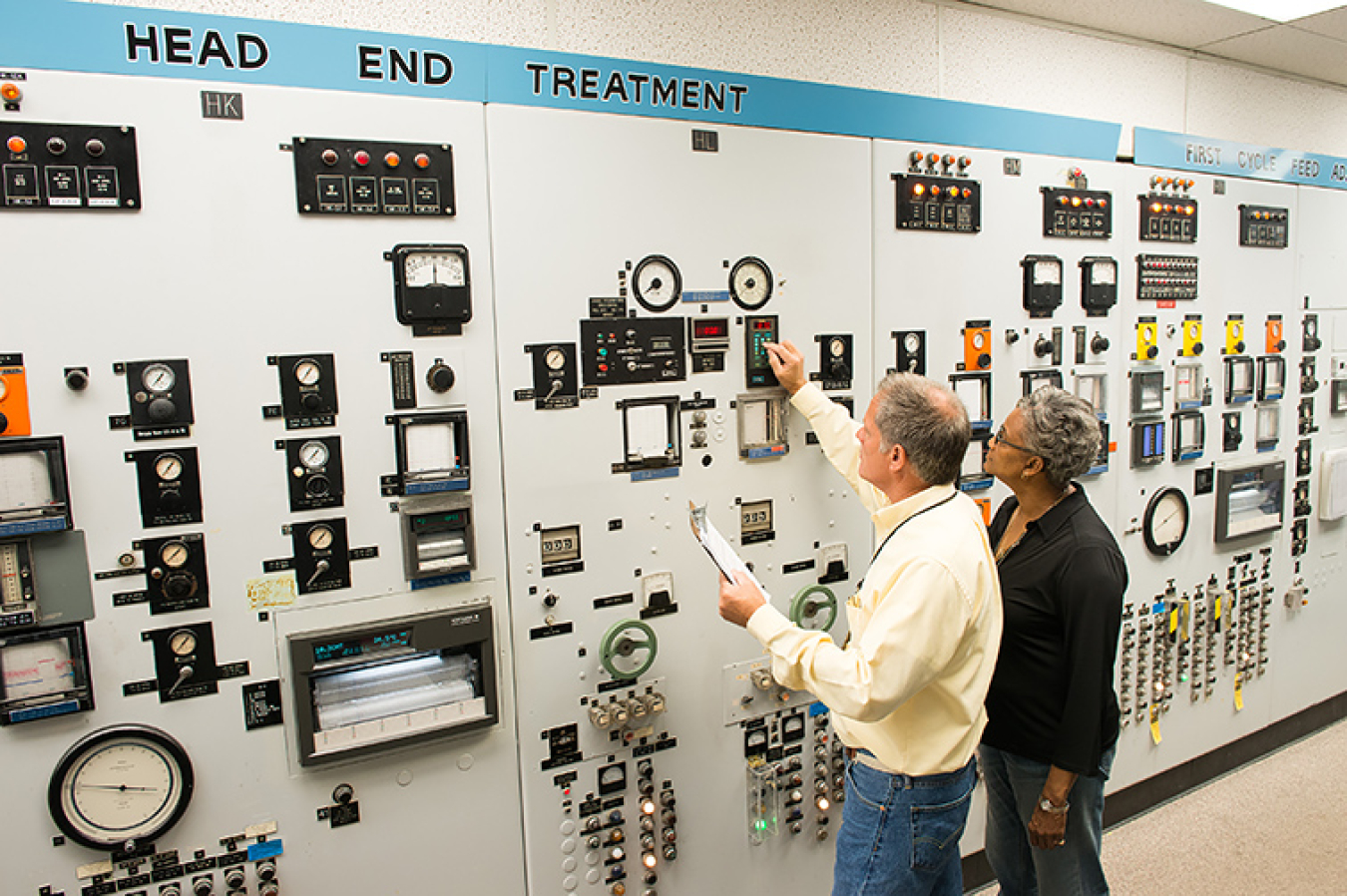
H Canyon Control Room operators Terry Usry and Audrey Davis start the first process operation in H Canyon, which purifies the uranium solution for eventual use as commercial nuclear reactor fuel.
AIKEN, S.C. – In its award fee determination scorecard for fiscal year 2015, DOE gave the Savannah River Site’s (SRS) management and operations contractor an overall “very good” rating, allowing the company to receive $37.8 million, or 82.7 percent of its total fee of $45.7 million.
DOE noted several milestones by Savannah River Nuclear Solutions (SRNS) in its work for EM and the National Nuclear Security Administration at SRS. DOE’s Voluntary Protection Program recognized SRNS as a STAR participant for continued excellence in safety programs, performance, and culture. The recertification process for DOE’s highest safety honor takes place every three years and analyzes DOE contractor safety performance, work activities, employee engagement, and overall safety culture. SRNS employees demonstrated a strong safety performance by reaching 10 million work hours without lost workdays resulting from job-related injury or illness.
The SRNS EM operations organization safely accomplished significant high-hazard work in nonproliferation and remediation missions without recordable injuries or contamination cases. DOE noted that workers completed four dissolver batches of Material Test Reactor spent nuclear fuel. The batches are used to dissolve the aluminum fuel bundles by heating nitric acid to a boiling point and converting solids to a liquid uranium solution for further process operations at H Canyon, which is the only operating, production-scale, radiologically shielded chemical separations facility in the U.S. DOE also noted the startup of the first process operation in H Canyon, which purifies the uranium solution for eventual use as commercial nuclear reactor fuel. The organization also successfully staged 40 bundles of spent nuclear fuel ahead of schedule in newly installed bundle storage racks inside the canyon. This ensures the availability of fuel to maintain process operations in the canyon through fiscal year 2016.
In SRNS spent fuel operations, workers completed a shielded transfer modification project to allow for receipt of National Research Universal/National Research Experimental fuel in advance of the original scheduled date. SRNS was able to overcome issues with subcontract supplied components to ensure that the first cask was received and processed prior to the end of fiscal year 2015. Modifications to the L Basin were completed ahead of schedule and below budget.
Operations at the SRS K Area Complex provide for the handling and interim safe storage for much of DOE’s excess plutonium and other special nuclear materials. In fiscal year 2015, SRNS completed all storage container surveillances and examinations required to ensure the safe storage of materials in K Area, which is DOE’s only Category 1 Special Nuclear Materials storage facility.
EM’s Savannah River National Laboratory (SRNL), which is part of the network of DOE national laboratories, applies its expertise and applied technology to EM’s cleanup. DOE noted SRNL’s success in attracting strategic partnership projects, such as the Nuclear Chemical Manufacturing Collaborative Facility, and for serving EM with excellent support. SRNL continues to play a pivotal role internationally and nationally, working in 24 states and more than 50 countries.
In its performance feedback, DOE identified opportunities for SRNS improvement, citing a procedural violation in HB-Line, the loss of power to a storage tank that uses an agitator to mix the material inside HB-Line, and other conduct of operations weaknesses that did not meet DOE expectations. The HB-Line is part of H Canyon.
DOE also pointed to other deficiencies, including inadequate coordination by SRNS employees that resulted in a loss of electrical power, and concerns with the SRNS emergency management planning resources and conduct of drills.
As a result of the operational performance issues, SRNS implemented a company-wide operational pause for all work not essential to the site’s safety and security. The pause was perceived as a positive action to strengthen the SRNS safety culture, leading to a comprehensive review of site-wide procedures and an engagement with the workforce on the importance of effective conduct of operations.
